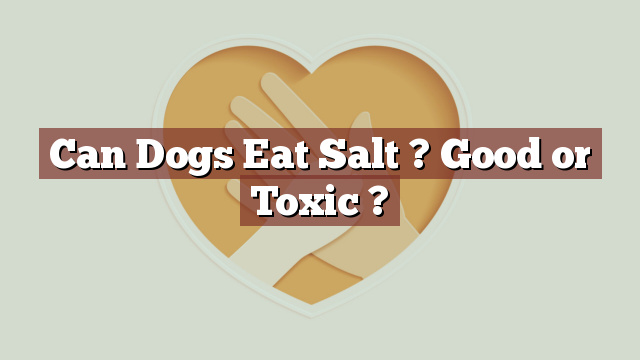Can Dogs Eat Salt? Good or Toxic?
Can dogs eat salt? This question often arises in the minds of dog owners who want to ensure the well-being and safety of their furry companions. It is crucial to be aware of what foods are safe for dogs to consume, as some human foods can be harmful or even toxic to them. In this article, we will explore whether salt is safe for dogs to eat and discuss any potential risks or benefits associated with its consumption.
Nutritional Value of Salt for Dogs
Salt, chemically known as sodium chloride, is a mineral that plays a vital role in various bodily functions for both humans and animals. It helps regulate fluid balance, maintain proper nerve and muscle function, and is essential for the overall health and well-being of an organism. However, it is important to note that dogs have different nutritional requirements than humans, and their bodies are not designed to handle excessive amounts of salt.
Can Dogs Eat Salt? Is It Safe or Toxic for Them?
Dogs can consume salt, but it should be done in moderation. While small amounts of salt are generally safe for dogs, excessive intake can lead to health issues. Dogs require a balanced diet that meets their nutritional needs, and excessive salt consumption can upset this balance. The Association of American Feed Control Officials (AAFCO) recommends a maximum of 0.3% sodium in dry dog food. It is essential to consult with a veterinarian to determine the appropriate amount of salt for your dog’s diet.
Scientific studies suggest that excessive salt intake in dogs can lead to electrolyte imbalances, dehydration, increased blood pressure, and kidney damage. Dogs with pre-existing health conditions, such as heart or kidney problems, may be more susceptible to the harmful effects of salt. Therefore, it is crucial to monitor your dog’s salt intake and ensure it remains within safe limits.
Potential Risks and Benefits of Dogs Consuming Salt
Excessive consumption of salt by dogs can lead to several health risks. High sodium levels can cause dehydration and contribute to heart and kidney problems in dogs. Symptoms of salt toxicity may include excessive thirst, increased urination, vomiting, diarrhea, lethargy, tremors, seizures, and, in severe cases, even death. On the other hand, consuming appropriate amounts of salt can help maintain a healthy balance of electrolytes in a dog’s body, which is necessary for proper nerve and muscle function.
What to Do If Your Dog Eats Salt?
If your dog accidentally consumes a large amount of salt or shows signs of salt toxicity, it is crucial to seek veterinary assistance immediately. The veterinarian will be able to assess the situation and provide appropriate treatment based on the severity of the symptoms. Do not induce vomiting or administer any home remedies without professional guidance, as this can potentially worsen the condition.
Conclusion: Moderation is Key when Feeding Dogs Salt
In conclusion, while salt is not inherently toxic to dogs, it should be consumed in moderation. Excessive salt intake can lead to various health issues, particularly in dogs with pre-existing health conditions. It is essential to ensure that your dog’s diet meets their specific nutritional needs and consult with a veterinarian if you have any concerns regarding their salt intake. Remember, a balanced and well-regulated diet is crucial for the overall health and well-being of our beloved canine companions.
Thank you for investing your time in exploring [page_title] on Can-Eat.org. Our goal is to provide readers like you with thorough and reliable information about various dietary topics. Each article, including [page_title], stems from diligent research and a passion for understanding the nuances of our food choices. We believe that knowledge is a vital step towards making informed and healthy decisions. However, while "[page_title]" sheds light on its specific topic, it's crucial to remember that everyone's body reacts differently to foods and dietary changes. What might be beneficial for one person could have different effects on another. Before you consider integrating suggestions or insights from "[page_title]" into your diet, it's always wise to consult with a nutritionist or healthcare professional. Their specialized knowledge ensures that you're making choices best suited to your individual health needs. As you navigate [page_title], be mindful of potential allergies, intolerances, or unique dietary requirements you may have. No singular article can capture the vast diversity of human health, and individualized guidance is invaluable. The content provided in [page_title] serves as a general guide. It is not, by any means, a substitute for personalized medical or nutritional advice. Your health should always be the top priority, and professional guidance is the best path forward. In your journey towards a balanced and nutritious lifestyle, we hope that [page_title] serves as a helpful stepping stone. Remember, informed decisions lead to healthier outcomes. Thank you for trusting Can-Eat.org. Continue exploring, learning, and prioritizing your health. Cheers to a well-informed and healthier future!

